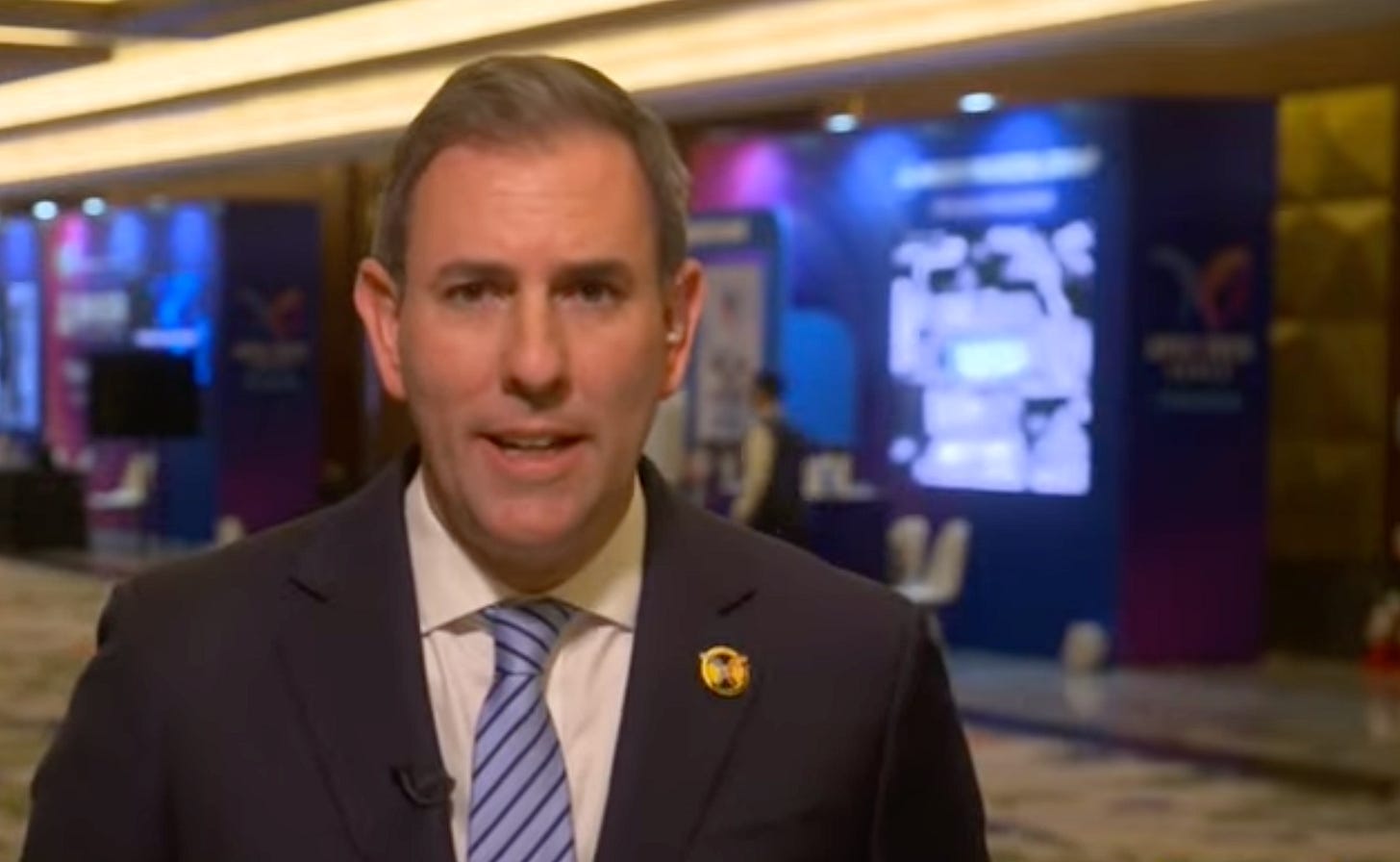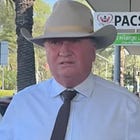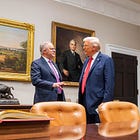Treasurer Chalmers Hails Trump Meeting as ‘Outstanding Success’ for Australia
This piece is freely available to read. Become a paid subscriber today and help keep Mencari News financially afloat so that we can continue to pay our writers for their insight and expertise.
Today’s Article is brought to you by Empower your podcasting vision with a suite of creative solutions at your fingertips.
Treasurer Jim Chalmers declared Prime Minister Anthony Albanese’s White House meeting with President Donald Trump an “outstanding success,” defending Ambassador Kevin Rudd’s performance and highlighting a major critical minerals agreement that positions Australia as a world leader in rare earth supply chains.
Speaking to ABC from the APEC summit in South Korea, Chalmers rejected suggestions the meeting went well due to luck, instead crediting extensive preparation by both sides and Rudd’s work in Washington.
“I don’t see it that way,” Chalmers said when asked if Australia had a lucky day. “I’ve seen the work that goes into these meetings, the preparation at the Australian end.”
The treasurer said he spent time with Rudd in Washington last week and witnessed firsthand the ambassador’s contributions to laying groundwork for the critical minerals deal and broader US engagement.
“A lot of effort goes into these meetings from both sides,” Chalmers said. “Australia did a lot of work to put our best foot forward in these really important discussions.”
Truth matters. Quality journalism costs.
Your subscription to Mencari directly funds the investigative reporting our democracy needs. For less than a coffee per week, you enable our journalists to uncover stories that powerful interests would rather keep hidden. There is no corporate influence involved. No compromises. Just honest journalism when we need it most.
Not ready to be paid subscribe, but appreciate the newsletter ? Grab us a beer or snag the exclusive ad spot at the top of next week's newsletter.
Rudd Defended After Awkward Exchange
Chalmers pushed back against criticism of Rudd following an uncomfortable moment during the Oval Office meeting when Trump appeared not to recognize the ambassador.
“I think Kevin handled it really well actually and I don’t think anyone who has seen the extraordinary amount of work that Kevin has put into this meeting and to our engagement with the US and the administration more broadly would conclude anything other than he has been a really important force for good for Australia in Washington DC,” Chalmers said.
The treasurer said he works closely with Rudd on the economic partnership and has seen his contributions directly.
“The government is really grateful for his work and I personally think that we are very fortunate to have him there,” Chalmers said.
$3 Billion Critical Minerals Investment
The centerpiece of the Trump meeting was a framework agreement for critical minerals cooperation, with the US and Australian governments planning to invest more than $3 billion in projects over the next six months. Recoverable resources in the targeted projects are estimated at $53 billion.
“This is all about ensuring that Australia can be a reliable supplier of rare earths and critical minerals,” Chalmers said. “It’s about strengthening the economic partnership with the US. It’s about bolstering supply chains.”
The treasurer described the deal as recognition of a “golden opportunity for Australia” in an industry that will become increasingly important to modern technology and defense sectors.
“This is an investment which recognises the golden opportunity for Australia in critical minerals,” Chalmers said. “It recognises that the world desperately wants what Australia can offer.”
Budget Impact and Funding Source
Chalmers outlined how the government will fund its share of the critical minerals investment without adding to budget pressures.
“We will reallocate unallocated funding from the Strategic Reserve, from the Critical Minerals Facility, from the National Reconstruction Fund to make sure that we do this in the most responsible way that we can,” Chalmers said.
He emphasized the framework will deliver tangible results for Australian workers, businesses and mining communities involved in extraction, refining and processing.
“It will deliver tangible results for our workers, our businesses, our communities, our mining communities in particular, whether it comes to mining or refining and processing,” Chalmers said.
When questioned about the framework not being legally binding or enforceable, Chalmers defended its value.
“Whatever legal status you want to apply to it, it is an extremely good outcome for Australia, for its people, for our economy,” Chalmers said. “This is an area where we have extraordinary advantages, and we intend to maximise those advantages.”
Competing With Chinese Suppliers
Addressing concerns about Chinese competition in rare earths markets, where China typically offers cheaper prices, Chalmers acknowledged market inefficiencies that multiple countries want addressed.
“The market for rare earths and critical minerals is not operating as effectively as a lot of countries, a lot of economies would like it to,” Chalmers said, noting this has been central to his discussions with international counterparts over the past two years.
He positioned Australia as playing a role in improving market function while supplying reliable resources.
“Australia as a big supplier big reliable supplier into these supply chains for critical minerals has a role to play to make sure that we’re improving the market as well as supplying the market,” Chalmers said.
The treasurer said Australia will continue engaging with all trading partners globally.
“We have exactly what the world needs when the world wants it and critical minerals and rare earths are an important part of that offering,” Chalmers said.
No Chinese Retaliation Expected
Chalmers dismissed concerns that the US minerals deal could trigger Chinese retaliation against Australian businesses or miners.
“No, I don’t believe so,” Chalmers said. “I think both of those countries understand that Australia engages in good faith with our trading partners, whether they be in Beijing or whether they be in Washington DC.”
He emphasized Australia’s consistent approach to international economic partnerships.
“We do that in good faith. We do that consistent with Australia’s national economic interest,” Chalmers said. “And that will continue to be the case.”
Tariff Deal Absence Not a Failure
Unlike the United Kingdom, which secured a tariff agreement with the Trump administration, Australia did not announce a tariff deal following the White House meeting. Chalmers rejected characterizing this as a failure.
“I don’t believe so,” Chalmers said. “Australia’s tariff arrangements with the US are the most accommodating of any country in the world.”
He noted Australia has made clear its position that the nation’s economic interests are best served by increased trade rather than barriers.
“We’ve made our view very clear for some time,” Chalmers said. “We’ve been able to make progress on a number of other important fronts today in this meeting, which was outstanding from our point of view, certainly from an economic point of view, but also in national security terms.”
Defence Spending Response
Addressing Trump’s comments about Australian defence spending levels, Chalmers said Australia is investing more substantially in defence than at any peacetime period in the nation’s history.
“We’re spending substantially more on defence. I think that’s recognised,” Chalmers said. “And when you measure our defence spending the same way that other parts of the world do, it is quite substantial. The increase is quite substantial.”
The treasurer described Trump’s comments as “accommodating when it comes to Australia’s position.”
He said both he and Finance Minister Katy Gallagher prioritize value for taxpayer dollars while supporting increased defence investment.
“We’re enthusiastic about lifting our defence spending. We want to make sure that we get maximum value for that,” Chalmers said. “But we’re investing, I think, increasing defence spending by more than at any other time during peacetime in Australia.”
Chalmers said Australia’s defence spending exceeds levels inherited from the previous government and that the nation can make its own case regardless of international commentary.
“Australia’s defence spending is going up. It is higher than what we inherited from our predecessors,” Chalmers said. “Our responsibility is to get maximum value for money.”
Trade Tensions Cast Shadow at APEC
From the APEC summit in Incheon, Chalmers said regional economic ministers view escalating US-China trade tensions as threatening global growth prospects.
“The region sees these trade tensions as casting a shadow over growth and casting a shadow over the global economy,” Chalmers said. “And the global economy is defined by risk and uncertainty. And trade tensions are part of the story.”
He reiterated Australia’s position favoring increased trade over barriers, a view he said resonates across the region.
“Australia’s interests are best served by more trade, not by more trade barriers. That’s true of the region as well,” Chalmers said.
While Australia’s direct exposure to US-China tariff disputes is relatively limited, Chalmers said the nation shares broader regional concerns about economic impacts.
“Like everyone here, we are concerned about the broader impacts, and that’s been part of the discussion here,” Chalmers said.
Meeting Preparation Emphasized
Throughout the interview, Chalmers repeatedly emphasized the extensive preparation undertaken to ensure productive outcomes from the Trump meeting, pushing back against suggestions of fortunate timing or luck.
“By any measure the progress that was made today between Prime Minister Albanese and President Trump represents a very good set of outcomes for Australia, a very, very successful meeting and important progress made in a number of areas,” Chalmers said.
The treasurer’s defense of both the meeting outcomes and Rudd’s role comes as the government faces opposition criticism over the handling of Australia’s most important international relationship.
The critical minerals framework announced during the meeting positions Australia to capitalize on growing global demand for rare earth elements essential to technology manufacturing, renewable energy systems and advanced defense equipment, with implementation expected to begin within six months.
Sustaining Mencari Requires Your Support
Independent journalism costs money. Help us continue delivering in-depth investigations and unfiltered commentary on the world's real stories. Your financial contribution enables thorough investigative work and thoughtful analysis, all supported by a dedicated community committed to accuracy and transparency.
Subscribe today to unlock our full archive of investigative reporting and fearless analysis. Subscribing to independent media outlets represents more than just information consumption—it embodies a commitment to factual reporting.
As well as knowing you’re keeping Mencari (Australia) alive, you’ll also get:
Get breaking news AS IT HAPPENS - Gain instant access to our real-time coverage and analysis when major stories break, keeping you ahead of the curve
Unlock our COMPLETE content library - Enjoy unlimited access to every newsletter, podcast episode, and exclusive archive—all seamlessly available in your favorite podcast apps.
Join the conversation that matters - Be part of our vibrant community with full commenting privileges on all content, directly supporting The Evening Post (Australia)
Catch up on some of Mencari’s recent stories:
It only takes a minute to help us investigate fearlessly and expose lies and wrongdoing to hold power accountable. Thanks!








